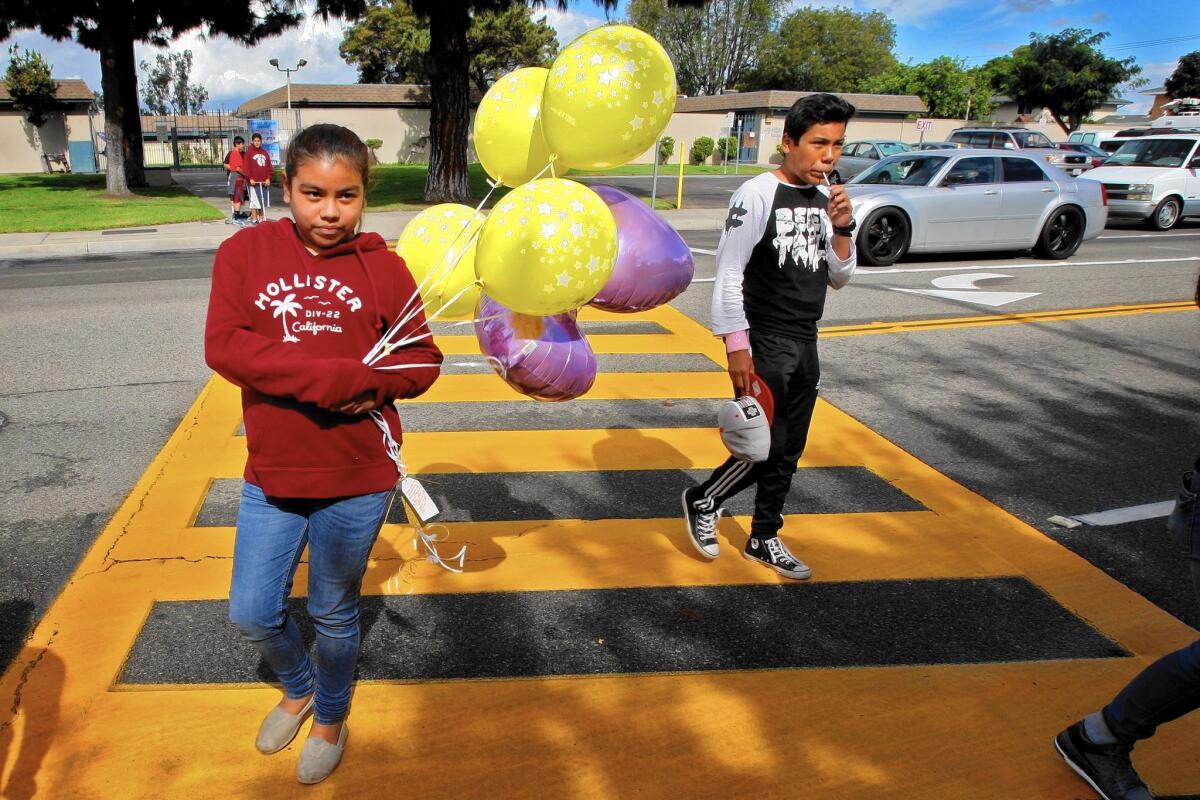Proposition 47 an important move in the right direction

- Share via
Given the record low voter turnout in California this week, I can’t begrudge the hour I spent helping the newest voter in my family make sense of a ballot loaded with confusing propositions.
She’d read the text of every measure and studied the arguments for and against, but was still worried about making the wrong choice. It was hard to square the official renditions with the hyperbolic campaign ads about greedy lawyers, drug-using doctors and power-hungry politicians.
The only measure that seemed straightforward to her was Proposition 47. That was also the only one of the ballot initiatives that voters didn’t reject.
Unlike the other three, Proposition 47 was pointed and clear: It lowers penalties for drug possession and petty theft to save money and make room in a prison system so overcrowded in our tough-on-crime era it’s been forced to turn inmates loose.
The new law makes California a national leader in progressive prison reform. “We want to focus on violent crime, instead of focusing on chronic drunks and minor drug addicts” who need treatment, not prison time, said UC Berkeley criminologist Barry Krisberg.
By reducing drug offenses from felonies to misdemeanors, it’s supposed to divert addicts from incarceration to treatment.
But it might also be considered an experiment in all that can go wrong. For some, the Halloween hit-and-run deaths of three trick-or-treaters are a tragic case in point.
The defendant in that case is a petty criminal given many chances to reform.
He wouldn’t have been covered by Proposition 47 because his years-long rap sheet has no felonies, just misdemeanors: domestic battery, child endangerment, driving while drunk, hit-and-run. But he’d been ordered more than once into drug and alcohol treatment, never spent much time behind bars and routinely violated his probation sentences.
That’s the scenario that some people fear now that Proposition 47 is law. “Clearly this guy simply does what he wants to do … and he does not care who his bad behavior hurts,” wrote Denny Knudsen of Tustin, who said the case cinched his vote against Proposition 47. “This is exactly what this state wants to leave on our streets, and I do not like the collateral damage we will endure!!!!”
::
Proposition 47 is an important move in the right direction. But its success depends on whether addicts and miscreants want to reform and will voluntarily seek treatment — and whether we are able to fund and create the right kind of programs to treat them.
Before the law changed, middle-class addicts could typically avoid jail time and criminal records, but poor people could not. “The guy with insurance will pay for drug counseling and the judge will say that’s fine. We’ve reserved the incarceration system for people with drug and mental problems who don’t have other options,” Krisberg said.
“The promise of 47 is to put the bloated corrections system on a diet, and move that money to the community to create more treatment slots,” he said.
Cases like the Orange County hit-and-run prop up stereotypes, he said. “We’ve manufactured that as an image — the guy who doesn’t want help and just keeps offending again and again — but that doesn’t represent all those people who are desperate for help.”
I’ve met the people he’s talking about, as they cycle through the system: The woman caught shoplifting cosmetics at Walgreens to sell on the street for a rock of crack cocaine. The man who lost custody of his children because he left them alone in a car while he shot up heroin at his dealer’s house.
Jail time doesn’t deter them; it just pushes them deeper into a lifestyle that becomes self-destructive.
“These are people who have gotten caught up in things, and we have to show them how to change,” said Mimi Silbert, who has spent 44 years working with alcoholics and addicts. “It’s a good thing to keep them out of prison. But we shouldn’t just excuse them, leave them out there and hope they’ll be OK, because I don’t think they will.”
Her program, Delancey Street, is considered the gold standard in creating responsible citizens out of hard-core alcoholics and addicts. “Some people will be able to go to meetings and get themselves cured, but once you go into prison you’re in a criminal culture,” Silbert said. “And it’s hard to pull yourself out.”
::
Richard Zamora had sunk too deep to climb out without help. The 42-year-old spent decades cycling in and out of prison before landing eight years ago at Delancey Street’s Los Angeles residential program. “I wanted to go back to being a decent person again,” said Zamora, who now works for the program.
He’s reserving judgment on Proposition 47 but said there are two things we need to understand: Rehab doesn’t work until an addict is ready. And recovery is not just about ditching drugs, but also changing destructive behavior.
“Drug addicts are the most selfish people on earth. They don’t think about anything beyond themselves,” he said. “They have no regard for their loved ones or other people’s property.”
Getting clean won’t solve their problems. “We have individuals in here who’ve sobered up, and they’re still making bad decisions and breaking rules,” he said. “It takes a long time to start caring about society and other people, and learn to be accountable for the choices you’re making for yourself.”
If Proposition 47 had been around when he was using drugs, he might not have made the lifestyle change sobriety required, he said. “I deserved to go to prison before, and if you break the law, I think you deserve to go to jail. But you also deserve the chance to become a decent person. And maybe this can help.”
Twitter: @SandyBanksLAT
More to Read
Sign up for Essential California
The most important California stories and recommendations in your inbox every morning.
You may occasionally receive promotional content from the Los Angeles Times.











